
A Palestinian mother sits beside her child in al-Rantisi Cancer Hospital in Gaza City. The Hospital provides medical treatment for children who suffer from cancers in Gaza strip. (Xinhua/Wissam Nassar)
GAZA, March 1 (Xinhua) -- Ibtisam Atteyeh, a 32-year-old mother, sat sleepless with sadness close to the bed of her 8-year-old son Fadi, who has been treated in al-Rantisi Cancer Hospital in northern Gaza City for two months, to make sure that he is still breathing.
Fadi has been suffering from a severe brain cancer, completely unconscious together with another 60 cancer patients. Most of the patients in the hospital are children, all having cannulas inserted into their arms getting chemotherapy and other medications.
As the world marks the Cancer Day on Feb. 4 to raise awareness of cancer and encourage its prevention, detection, and treatment, the Palestinian Health Ministry said cancer has become the second leading cause of death in the Palestinian territories.
"Cancer has rapidly spread into Fadi's brain and damaged his neural network and this has caused complete immovability," Atteyeh told Xinhua, adding that "there is no cure. We die a thousand times a day looking at the condition of our cancer-stricken children."
The Palestinian Health Ministry said in an emailed statement that in the past 17 years, cancer cases climbed from 1,273 in 2000 to 3,950 in 2017, adding that "14 percent of the deaths in Palestine were because of cancer, the second after heart disease which reached 30.6 percent."
The health ministry statement said that the rate of breast cancer rose to 15.3 percent, as the top kind of cancers that women were infected in the Palestinian territories in 2000-2017, followed by the colon cancer, blood cancer and lung cancer.
The ministry decided to intensify campaigns to urge early checkups, adding that the Palestinian Authority is working on developing various centers all over the Palestinian territories for fighting cancer.
Mohamed Abu Selmeya, director of al-Rantisi Cancer Hospital, told Xinhua that his hospital is the only one that provides medical treatment for cancer patients aged between one month and 15 years old, adding that "the Gaza Strip suffers a lot from the consequences of the Israeli blockade."
"The humanitarian situation in Gaza is so difficult with the shortage of electricity and the lack of fuel that operates the generators in the hospitals," said Abu Selmeya, adding that "one hospital and ten medical centers had their electric generators switched off, and we have deep concerns that this crisis would affect our hospital."
To ease the general health crisis in Gaza, the Palestinian Health Ministry decided this week to send 20 trucks loaded with various kinds of medications and medical equipment to Gaza. Qatar has also donated 9 million U.S. dollars last week to ease the severe health crisis in the Gaza Strip.
Meanwhile, Gaza health ministry spokesman Ashraf al-Qedra told Xinhua that besides the severe shortage of electricity and fuel, "there is also a severe lack of medical equipment and medicines, mainly for the cancer patients, amid the tight security measures imposed by Israel on the patients who need medical treatment."
Cancer in the Gaza Strip had also increased amid the tight security restrictions Israel imposed on the movement of individuals, including patients at the crossing points that Israeli controls on the borders with the coastal enclave, according to Gaza-based right groups.
Mohamed Bseiso, a Palestinian lawyer in charge of a unit of transferring patients in the Palestinian Center for Human Rights (PCHR), told Xinhua that his unit has been working hard recently on helping patients to travel from Gaza to Israel for urgent medical treatment.
"As cancer patients have the priority for medical treatment, we intensify our coordination with the Israeli side to help them leave the Gaza Strip to hospitals in Israel, East Jerusalem and the West Bank for urgent medical treatment," said Bseiso.
He said cancer patients from Gaza who need radiotherapy and chemotherapy usually spend 45 days in the hospitals in both Israel and East Jerusalem before returning to Gaza, adding "they usually receive a one-day Israeli permission to reach the hospitals, stay there and then they can't leave anywhere else."
Bseiso unveiled that sometimes the Israeli side delays issuing permission for security reasons, adding that "the Israeli side only cares about security and this certainly brings negative influence on the lives of cancer patients, who wait sometimes so many weeks while treatment is delayed."
The PCHR said in an official survey issued last month that during 2017, the center dealt with 1,019 application presented to the Israeli side asking for permissions for patients of all kinds of diseases, 800 of them cancer patients, but their movement from Gaza to Israel was either delayed for several weeks, or denied.

